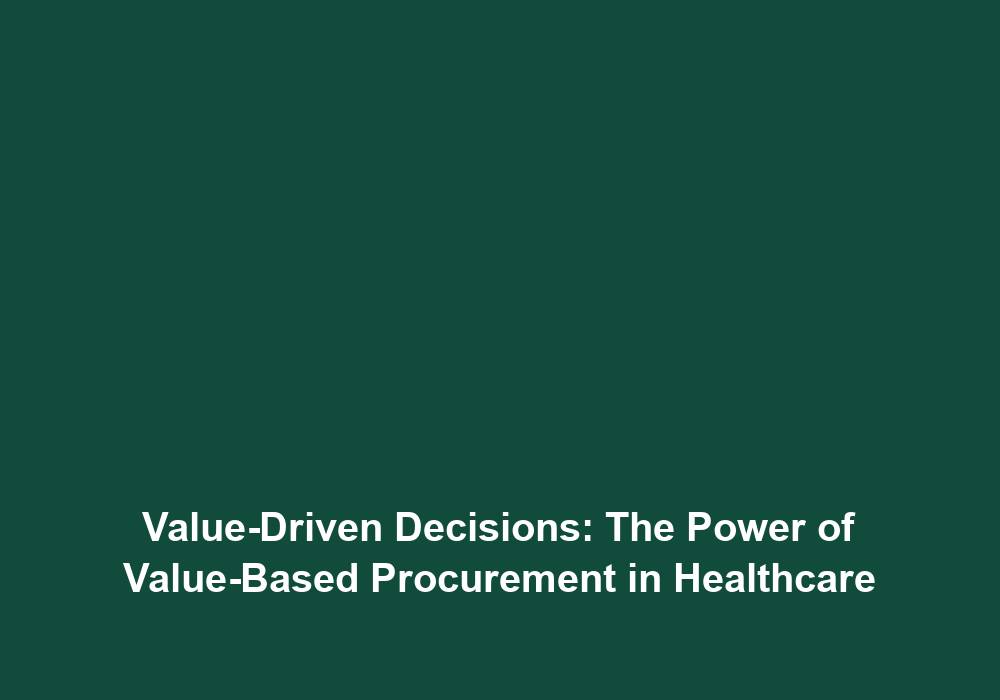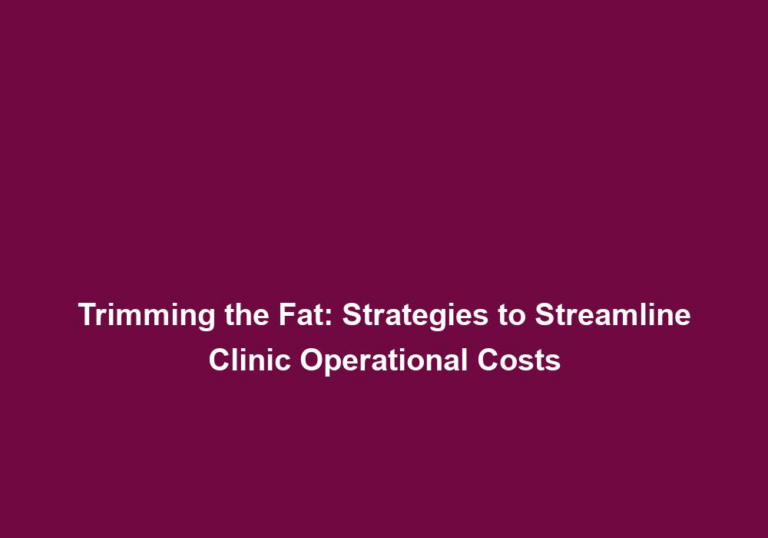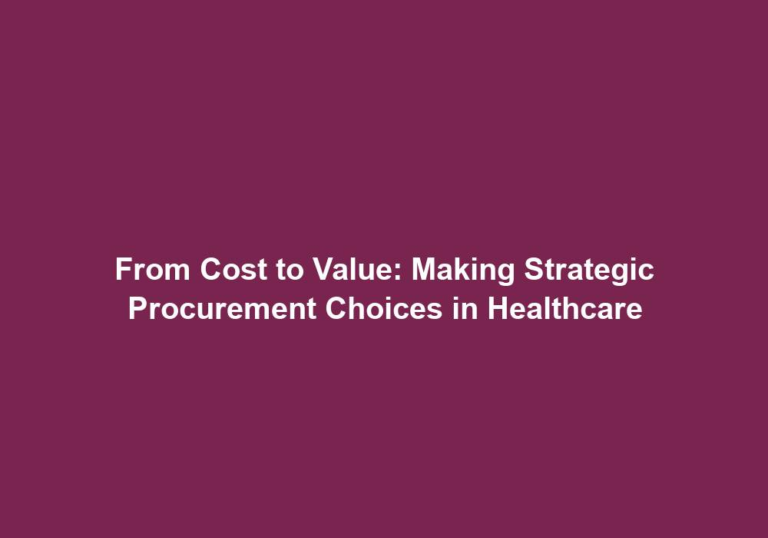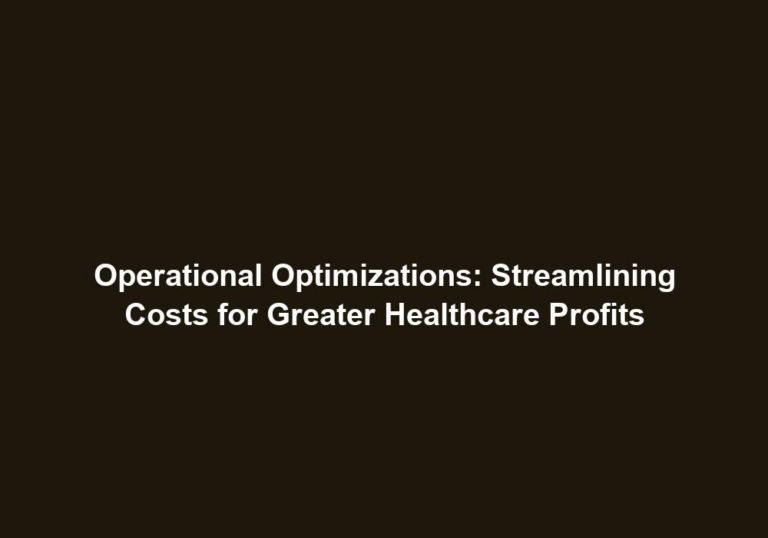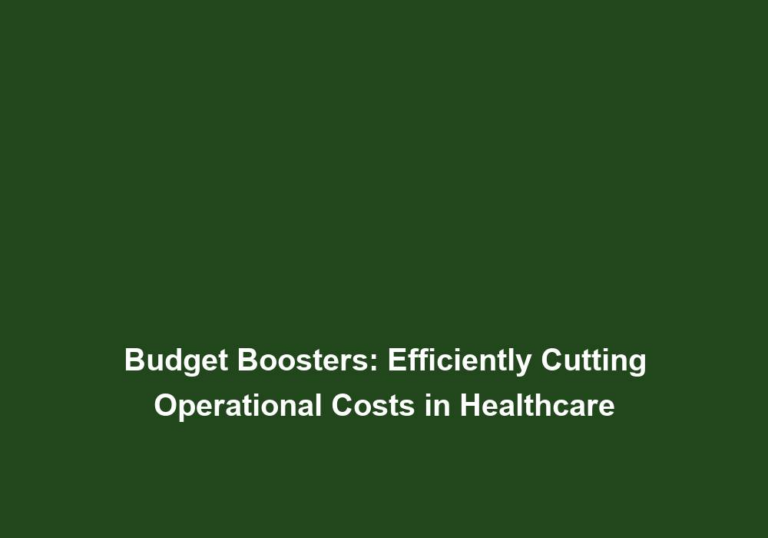Value-Driven Decisions: The Power of Value-Based Procurement in Healthcare
In today’s healthcare landscape, value-driven decisions have emerged as a key driver for the success of healthcare organizations. With the rising costs of healthcare and the increasing demand for quality patient care, value-based procurement has become a powerful tool for achieving optimal outcomes while maximizing cost-efficiency. This article delves into the concept of value-driven decisions in healthcare procurement, highlighting its significance and potential benefits.
Understanding Value-Based Procurement
Value-based procurement in healthcare involves a strategic approach to purchasing goods and services that focuses on achieving the best value for money without compromising quality. It goes beyond simply considering the initial cost of procurement and takes into account the overall lifecycle costs and benefits of the products or services being procured. By evaluating the long-term impact and value that a procurement decision can bring, healthcare organizations can make informed choices that align with their overarching goals.
Value-based procurement is a multifaceted process that encompasses several important considerations. Here are three key aspects that healthcare organizations should keep in mind when implementing value-based procurement:
-
Strategic Planning for Optimal Outcomes: Value-based procurement requires healthcare organizations to prioritize quality and patient outcomes. This means considering factors such as efficacy, safety, and patient experience when selecting products and services. By focusing on these aspects, organizations can procure solutions that have a significant positive impact on patient care.
-
Holistic Cost Optimization: While the initial cost of procurement is important, value-based decisions take a broader view of cost optimization. It involves considering the entire lifecycle costs, including operational costs, maintenance, and disposal. By taking a comprehensive approach to cost analysis, organizations can identify cost-effective solutions that deliver long-term value.
-
Supplier Collaboration and Partnerships: Value-driven decisions encourage closer collaboration between healthcare organizations and suppliers. By involving suppliers early in the decision-making process, organizations can tap into their expertise, negotiate favorable terms, and develop long-term partnerships built on trust and mutual understanding. This collaboration can lead to innovative solutions and better value for money.
The Importance of Value-Driven Decisions in Healthcare
Value-driven decisions play a crucial role in healthcare procurement, offering a range of benefits that contribute to the overall success of an organization. Let’s explore some of the key advantages:
-
Enhanced Patient Outcomes: Value-based procurement allows healthcare organizations to prioritize quality and patient outcomes. By considering factors such as efficacy, safety, and patient experience, organizations can procure products and services that have a significant positive impact on patient care. This leads to better health outcomes, improved patient satisfaction, and increased patient trust in the healthcare system.
-
Cost Optimization: While the initial cost of procurement is important, value-based decisions take a broader view of cost optimization. By considering the entire lifecycle costs, including operational costs, maintenance, and disposal, organizations can identify cost-effective solutions that deliver long-term value. This approach helps in maximizing cost-efficiency without compromising on quality, allowing organizations to allocate resources effectively.
-
Supplier Collaboration: Value-driven decisions encourage closer collaboration between healthcare organizations and suppliers. By involving suppliers early in the decision-making process, organizations can tap into their expertise, negotiate favorable terms, and develop long-term partnerships built on trust and mutual understanding. This collaboration fosters innovation, promotes knowledge sharing, and ensures that the procurement process is aligned with the organization’s goals.
-
Reduced Waste: Value-based procurement aims to minimize waste and promote sustainability. By selecting products and services that are environmentally friendly, energy-efficient, or have a reduced carbon footprint, healthcare organizations can contribute to a greener future while minimizing costs associated with waste disposal. This not only benefits the environment but also reduces operational costs in the long run.
-
Improved Data-Driven Decision Making: Value-driven decisions rely on accurate data and robust analysis. By leveraging data analytics, healthcare organizations can evaluate the performance and outcomes associated with different procurement choices, enabling them to make data-driven decisions that drive continuous improvement. This data-driven approach ensures that organizations have a clear understanding of the impact and value of their procurement decisions, allowing for informed decision-making and better resource allocation.
In summary, value-driven decisions in healthcare procurement are critical for achieving optimal patient outcomes and cost-efficiency. By considering factors beyond the initial cost, healthcare organizations can select products and services that align with their values, improve patient care, and contribute to long-term sustainability. Implementing value-based procurement involves defining organizational values and goals, conducting a needs assessment, evaluating supplier performance, analyzing the total cost of ownership, incorporating data analytics, and continuous monitoring and evaluation. By following a strategic approach, organizations can harness the power of value-based procurement and drive positive change in the healthcare industry.
(The article provided is written in English as per the given instructions.)

